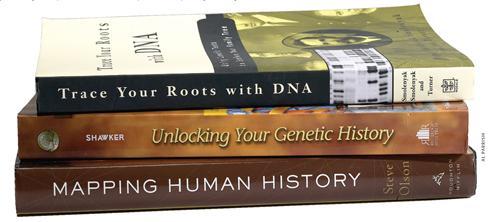Sign up for the Family Tree Newsletter Plus, you’ll receive our 10 Essential Genealogy Research Forms PDF as a special thank you!
Get Your Free Genealogy Forms
"*" indicates required fields

2. Trace Your Roots with DNA: Using Genetic Tests to Explore Your Family Tree by Megan Smolenyak Smolenyak and Ann Turner (Rodale). Just a decade ago, genealogists had to rely on finding historical documents to link generations and prove their ancestry. Though they could satisfactorily prove a lineage historically, they weren’t able to prove it biologically. All that’s changed now. Today DNA testing is simple, and you don’t have to dig up Great-great-grandpa to prove you’re related to him. DNA-testing companies offer kits to take a swab of cells from inside your cheek. In Trace Your Roots with DNA, the authors explain what type of information these tests can provide, how to interpret the results and how the tests work. You’ll also learn ways to find and contact “genealogy cousins” to help with your DNA search. The authors — both avid genealogists — give you the latest information and resources to on how to use DNA in your family history search.
3. Unlocking Your Genetic History: A Step-by Step Guide to Discovering Your Family’s Medical and Genetic Heritage by Thomas H. Shawker (Rutledge Hill Press). Ever wonder how to find out if the cancer Aunt Martha had runs in your family? Or how you can prove your ancestry through DNA testing? The latest book in the National Genealogical Society Guides series, Unlocking Your Genetic History shows how you can tailor your genealogical search to discover what traits and diseases might run in your family, as well as how you can use DNA testing to support or refute your ancestry. As you flip past the illustrations, you might be tempted to put it down, thinking the subject is too complex. But Shawker — a medical doctor and genealogist — has a remarkable ability to make this complicated topic not only understandable to a lay audience, but also interesting. He uses examples of famous and lesser-known ancestral studies to demonstrate how important our genetic heritage is. This book is comprehensive, well-written and reader-friendly, and for those fascinated by the science of genetics and DNA testing, it’s a compelling read.
Extra Credit
? DNA and Family History: How Genetic Testing Can Advance Your Genealogical Research by Chris Pomery (The [British] National Archives)
? DNA for Family Historians booklet by Alan Savin (Genetic Genealogy Guides <www.savin.org>)
ADVERTISEMENT

